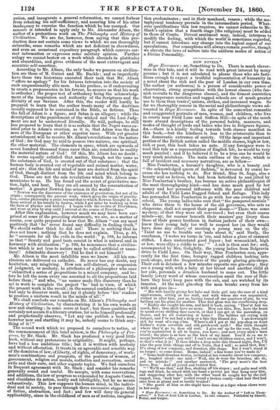NEW NOVELS. * Hope .Evermore; or, Something to Do. There is
much clever- ness in this tale, and it will be read with great interest by many persons ; but it is not calculated to please those who are fasti- dious enough to expect a truthful representation of humanity in a novel about the rich and the poor of London in our own time. The author (or authoress) is a person of considerable power of observation, strong sympathies with the lowest classes (who fur- nish recruits to the dangerous classes), and the firmest conviction that temperance societies and ragged schools are of much greater use to them than trades': unions, strikes, and increased wages. So far we thoroughly concur in the social and philanthropic views ad- vocated in Hope Evermore. In spite of the somewhat romantic and exaggerated portraits of men, women and children, who live in courts near Field Lane and gaffron Hill—in spite of the much more absurd descriptions of the personal habits, manners, and modes of thought of lords and ladies who live in Belgrave Square, &s.—there is a kindly feeling towards both classes manifest in this book,—but the kindness is less to the aristocratic than to the democratic extremes of society. Of the large and important portion of the British nation called the middle classes, high or low, rich or poor, this book takes no note. If any foreigner were to read this tale as a representation of English life, he would be very much puzzled ; and if he believed it to be a true one he would be very much mistaken. The main outlines of the story, which is full of incident and accessory narratives, are as follow—
Miss Pemberton, a baronet's daughter, who is a beauty and " the acknowledged queen of fashion," is devoured by ennui be- cause she has nothing to do. Her friend, Miss St. Ange, also a beauty and an heiress, who had been betrothed to and jilted by Miss Pemberton's brother, has become an active philanthropist of the most thoroughgoing kind—and has done much good by her money and her personal influence with the poor children and adults of the Field Lane Ragged School and Refuge. This lady has persuaded Miss Pemberton to go with her one evening to the school. The young ladies take care that " the pampered menials" who drive them to the house of the old governess, who acts as chaperone, shall not suspect their good deeds—" There was some mystery, of that they were all convinced ; but even their coarse minds—ay, far coarser beneath their masters' gay livery than those of their poorer brethren in fustian jackets of their own— knew their young lady too well to suspect her (as they would have done any other) of meeting a young man on the sly. ' Taint no use to trouble our 'cads about it,' said Burly, the coachman, I wotes we turns in 'ere, and takes a glass of summut stiffish. I does understand good liquor ; but womankind, high or low, were ollys a riddle to me.' " A cab is then sent for; and, accompanied by Mrs. Golightly, the young ladies from Belgravia drive to Field Lane. On their way, Miss Pemberton sees, appa- rently for the first time, hungry ragged children looking into cook-shops, and the frequenters of the gaudy glaring gin-shops. Their cab is detained a few minutes opposite one gin-shop ; they see a young wife with a baby at her breast and 'another child at her side, persuade a drunken husband to come out. The little family (every word of whose conversation amid the roar of Hol- born they hear) keep pace with the cab, and are watched by its inmates. At the next gin-shop the man breaks away from his wife and goes in-
" His wife hastily giving her babe and little girl into the care of a kind applewoman, sitting at her stall, and with whom she was acquainted, rushed in after him, just as, having tossed off one quartern of gin, he was holding out his glass for another. That first glass was the overflowing drop. " Rashly she caught his arm, and held it back, saying, Thee'st had too much, Ben ; thee shalt have no more. How can thee, Ben, have the heart to spend every shilling thee easiest, or that I can get at the pawnshop, on liquor, and we all a-starving at home ? The bobbies are crying with hunger, and I've not had a drop or a bite this blessed day. I am downright sick for want of a cup o'tea. Where's all I got at the pop-shop on Aunt Esther's warm coverlids and silk patchwork quilt ? She little thought where they'd go to, dear old soul. I give ern' up for the rent, Ben' and
'
you've squandered it all in liquor, you have ; and now every stick's been seized ; the place is as bare as the back of my hand. You'll dr.ve me to accept brother's offer, you will! I can't see my children starve, and I won't, so that's what it is! If thou drinks a drop more this blessed night, Ben, I'll take the poor little things and off to Notts, that I will ; so mind that, Ben ! It's along of low company, and drunken, idle chaps. But I won't stand it no longer ; so come home. Home, indeed ! a fine home you've made it.' " Some half-drunken brutes, irritated at her remarks about low company, &e. laughed aloud : one said—' Well, she do wear the breeches, she do, and no mistake !' and another answered, The grey mare's the best horse, Ben.' And all jeered and twitted Ben.
"' We'll see that,' said Ben, shaking off his stupor ; and quite mad with
rage and drink, he seized with one band a pewter pot that hung near him, and staggering after her, with the other hand he caught her by the dull ragged, long, back hair' (coiled round a broken comb)—that hair that had once been so glossy and so neatly braided
" She gazed at him as she might have done at a tiger whose claws were in her scalp.
• Hope Brermore ; or, Something to Do. By the Author of " Left to Them- selves.' A Tale of Arab Life in London. In two volumes. Published by Cassell, , Petter, and Galpin.
" Alas! she knew his symptoms well. She saw he was no longer maudlin —he was mad. She struggled to free herself, but in vain. He raised his arm, and with the quart pot he struck her savagely on the temple. " It was this blow that Ada saw. Oh do not, do not strike her,' she cried, involuntarily ! unconsciously ! vainly ! " At that very moment, while her eyes and Ellen's were straining to see what became of the woman, who had fallen down as if shot—and while Mrs. Golightly was exclaiming, There's a type of the modern husband,' the cab- man turned sharply round the corner, hiding from their distended eyes the woman so savagely beaten down."
There is a certain artistic constructiveness in the author. Ben Darrell and the wife whom he has just murdered, and the applewoman who has taken the children, are among the pro- minent persons in the book, and their histories are essential parts of the tale. Mrs. Golightly and 'Miss St. Inge were well acquainted with the apple woman Mrs. Blossom, who is a model poor man's wife, and for her beauty is known in the neighbour- hood of Holborn Hill and Saffron Hill as Apple Blossom. At the Ragged School that evening Miss Pemberton is introduced to a lovely little girl called Hope Evermore, who is foster child to Apple Blossom, and was born in a lying-in-hospital. Her mother was "a real lady," and no more is known of her. Hope Evermore has golden locks and blue eyes, and is of the angelic order of beings like "Eva" and " Little Nell." She has one ad- vantage over them—she is not consumptive, but lives to grow up and to be recognized as the daughter of Miss Pemberton's brother by the wife for whom hejilted Miss St. Ange. But Hope re- mains faithful to her early love for Larky Grig, alias Gregory Blossom, the clever son of Apple Blossom. who becomes a great civil engineer, and finally marries Hope, who is then Countess of Glenlonely in her own right—by a singular freak of the law of succession. The varied history of Hope, from her first appearance in the ragged school to her marriage with Sir Gregory Blossom, makes the reader acquainted with many people. Ben Darrell, the man who gave his wife her death blow, as described above, is described when sober as the most loving and tender husband. He is horrified at the deed he has committed. He is tried for murder. Miss Pemberton, who from the cab had seen the blow, is subpoenaed to attend the inquest the next day. She renews her acquaintance with Jem Goodman, a master sweep, who is a great philanthropist, a missionary of the temperance society, and a teacher in the Field Lane Ragged School. This Jem Good- man appears to us the best drawn character in the book. There is a look about his picture as if it were a portrait. He is a quiet, religious, hardworking man, such as we have reason to believe may be found doing good continually to the destitute and vicious of our large towns—Christians in profession and in practice. He comforts Ben Darrell in Newgate, and procures a commutation of his sentence. This is brought, for the greater effect, just as the culprit is about to be operated on by Calcraft, and after he has made a speech to the assembled crowd against drunkenness. If such a speech were ever made in such circumstances we can be- lieve that it might convert some few from the evil of their ways. Darrell's little girl and boy are adopted by their mother's brother, and educated as a lady and gentleman. The girl is made to turn out clever, ambitious, and externally polished, but a monster of ingratitude to her early lowly friends of Field Lane. As far as we are able to judge, the author's account of the manners and habits of the poor and coarse children who frequent the ragged schools, as well as of the drunken husbands and ill-used wives, is not very correct. It is exaggerated and dressed up to look well in a tale. As to the habits, thoughts, and feelings of the aristo- cracy on many points, we have been accustomed to think them not very much unlike the rest of humanity, and we cannot believe that Lady Pemberton would be so violently affected with delight at the news of the death of some near relations, which would make her " a peeress of the realm." People generally take with calm- ness an event which was probable, and which does not materially alter their position in life. Nor can we believe that her husband was so overwhelmed with "letters begging for judgeships," &c., on his accession to an earldom. He was not a minister, even, as far as we are informed. The cleverness, gdod intention, and ig- norance displayed in this tale are about equal. There is much in it that will be quite new to regular novel-readers, and from which they may profit as from good sermons and lectures on the vices and weakness of our civilized country. To the author we say—" You have not written a really good book, though your will to do so was steady. You have yet to learn how to use your knowledge, and your noble aspiration as an artist in literature."



























 Previous page
Previous page